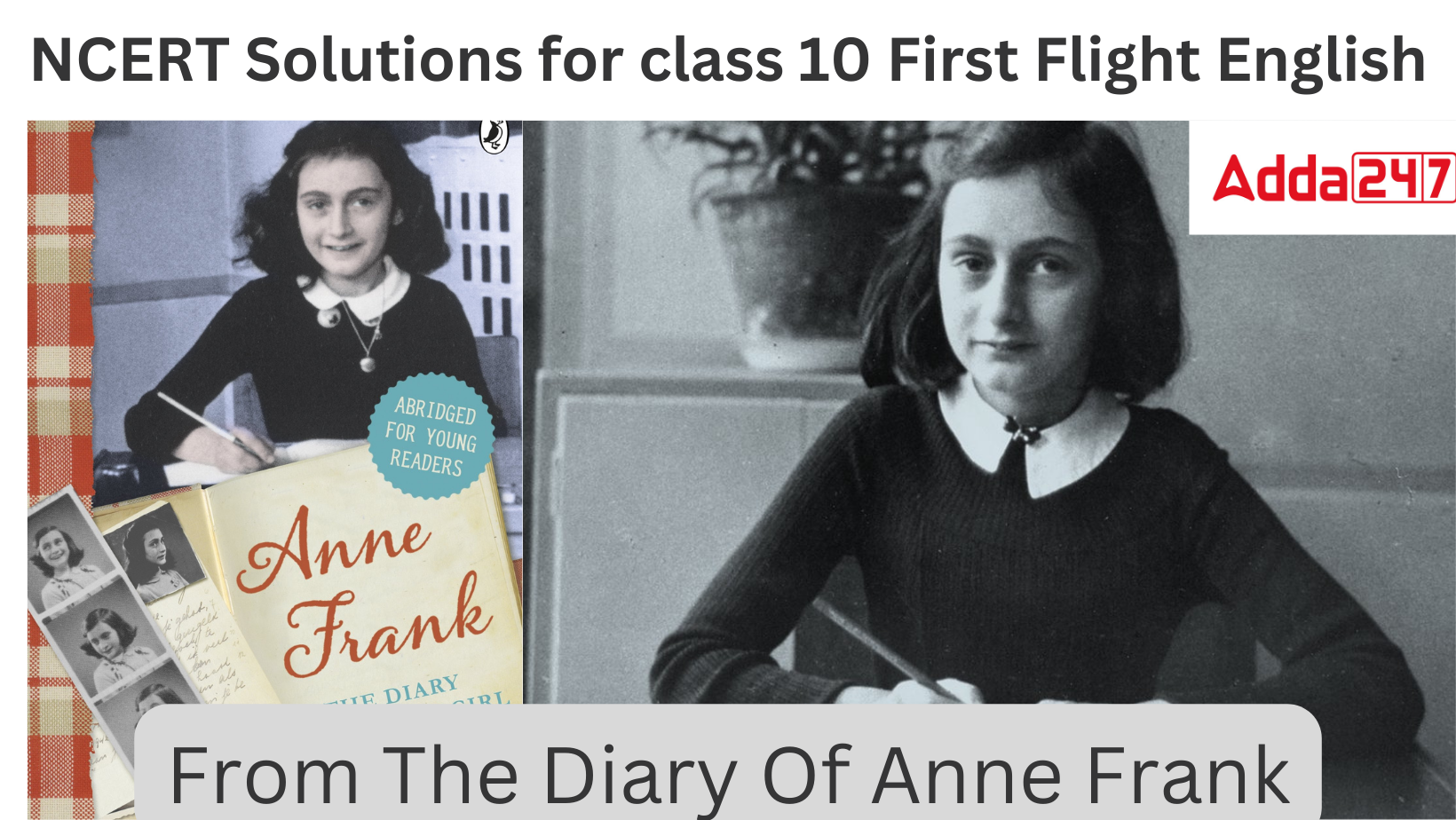Anne Frank’s Diary is one of the most touching stories that every Class 10 student reads in their English First Flight textbook. To make learning easier, we bring you well-explained NCERT Solutions for Class 10 English First Flight Chapter 4 From the Diary of Anne Frank. These solutions are written in simple language so that students can understand the chapter clearly and answer questions confidently in exams. With these answers, students can not only prepare better but also improve their writing skills. NCERT solutions are the best guide to build strong exam preparation. Check the complete solved questions below for easy learning.
NCERT Solutions For Class 10 English First Flight Chapter 4 From The Diary Of Anne Frank
This is the autobiography of young Anne Frank, who kept a journal as a way of expressing herself. On her thirteenth birthday, her father gave her the Diary, which she refers to as “Kitty.” Jewish girl named Anne Frank is hiding from the Nazis during World War II. During her depressive episode, she shares the story and her experience. She also hides with seven other persons at the covert annexe on the Prinsengracht 263 in Amsterdam. She spends two years there and documents every encounter in her diary. She devotes her time and effort to writing and studying in order to learn about politics and literature. Because of the diary, she gains international fame after her passing.
NCERT Solutions For Class 10 English First Flight Chapter 4 From The Diary Of Anne Frank: Video Explanation
Watch the given video explanation for a better understanding of the chapter
NCERT Solutions For Class 10 English First Flight Chapter 4 From The Diary Of Anne Frank: PDF
Students can get Class 10 English First Flight Chapter 4 – From the Diary of Anne Frank in PDF format by clicking the link below. All of the chapter’s key questions and answers are conveniently accessible in this PDF. Students can utilize it to improve their comprehension of the book, swiftly revise, and get ready for tests. It is convenient to study at any time and from any location without relying on the internet when the solutions are available in PDF format. To help you prepare for the test more efficiently and successfully, download the PDF now and save it for later use.
NCERT Solutions For Class 10 English First Flight Chapter 4 From The Diary Of Anne Frank
NCERT Solutions For Class 10 English First Flight Chapter 4 From The Diary Of Anne Frank: Solved Textbook Questions
Activity (Page 49)
Question 1: Do you keep a diary? Given below under ‘A’ are some terms we use to describe a written record of personal experience. Can you match them with their descriptions under ‘B’? (You may look up the terms in a dictionary if you wish.)
| A | B |
| (i) Journal | – A book with a separate space or page for each day, in which you write down your thoughts and feelings or what has happened on that day |
| (ii) Diary | – A full record of a journey, a period of time, or an event, written every day |
| (iii) Log | – A record of a person’s own life and experiences (usually, a famous person) |
| (iv) Memoir(s) | – A written record of events with times and dates, usually official |
Answer:
| A | B |
| (i) Journal | – A full record of a journey, a period of time, or an event, written every day |
| (ii) Diary | – A book with a separate space or page for each day, in which you write down your thoughts and feelings or what has happened on that day |
| (iii) Log | – A written record of events with times and dates, usually official |
| (iv) Memoir(s) | – A record of a person’s own life and experiences (usually, a famous person) |
Question 2: Here are some entries from personal records. Use the definitions above to decide which of the entries might be from a diary, a journal, a log or a memoir.
(i) I woke up very late today and promptly got a scolding from Mum! I can’t help it — how can I miss the FIFA World Cup matches?
(ii) 10:30 a.m. Went to the office of the Director
01:00 p.m. Had lunch with Chairman
05:45 p.m. Received Rahul at the airport
09:30 p.m. Dinner at home
(iii) The ride to Ooty was uneventful. We rested for a while every 50 km or so, and used the time to capture the magnificent landscape with my HandyCam. From Ooty we went on to Bangalore.
What a contrast! The noise and pollution of this once-beautiful city really broke my heart.
(iv) This is how Raj Kapoor found me — all wet and ragged outside R.K.Studios. He was then looking for just someone like this for a small role in Mera Naam Joker, and he cast me on the spot. The rest, as they say, is history!
Answer:
(i) Diary
(ii) Log
(iii) Journal
(iv) Memoir
Oral Comprehension Check (Page 51)
Question 1: What makes writing in a diary a strange experience for Anne Frank?
Answer: Writing in a diary was a strange experience for Anne Frank because she had never written anything before in a diary as she had received it as a gift on her thirteenth birthday. She considered the diary to be her best friend, where she could write all her thoughts and feelings. However, she also felt that no one would be interested in the musings of a thirteen-year-old schoolgirl. Hence she could write freely in the diary to get all her worries off her chest.
Question 2: Why does Anne want to keep a diary?
Answer: Because she had no friends, Anne used to feel depressed and alone all the time. She wished to release all of her problems and concerns. She consequently made the decision to maintain a journal in which she could share her secrets and treat it as a true friend.
Question 3: Why did Anne think she could confide more in her diary than in people?
Answer: Paper, in Anne’s opinion, had greater tolerance for her mental state than people did. She found it more convenient to record all of her wishes and thoughts in a journal. Because it was private and was not intended for anybody else to read, she thought her personal journal was the best place to confess her secrets.
Oral Comprehension Check (Page 51)
Question 1: Why does Anne provide a brief sketch of her life?
Answer: In order to convey her family, school, and self, Anne gave a brief account of her life. Reading her diary would make it easier for the reader to relate to both her and everything going on around her at the time.
Question 2: What tells you that Anne loved her grandmother?
Answer: During the time when her parents were settling in Holland, Anne lived in Aachen with her grandmother. She kept a diary about her grandmother because they were so close. However, she remarked that “no one knows how often I think of her and still adore her” after her grandmother passed away in January 1942. She wanted to express how much she loved her granny with this message. She lit one candle with the others on her thirteenth birthday to honour her loving grandmother and to show her love and gratitude.
Oral Comprehension Check (Page 54)
Question 1: Why was Mr Keesing annoyed with Anne? What did he ask her to do?
Answer: Anne was a very talkative girl, which angered Mr. Keesing. In order to keep her quiet, he frequently gave her extra homework assignments requiring her to write essays about subjects close to her nature.
Question 2: How did Anne justify her being a chatterbox in her essay?
Answer: In her essay, Anne explicitly said that she had inherited her mother’s talkativeness, who was at least as talkative as she was, to support her claim that she was a chatterbox. She added that these inherited qualities were helpless to change.
Question 3: Do you think Mr. Keesing was a strict teacher?
Answer: No, Mr. Keesing wasn’t an unduly strict teacher, but he did demand that his students behave properly and in silence when he lectured the class. In actuality, a teacher is constantly concerned about his pupils’ welfare. Any teacher will become irritated if the kids discuss in class after class. Since Anne spoke a lot, Mr. Keesing found her annoying. He would therefore assign her extra work and frequently instruct her to write essays about her talkative nature as a form of punishment. It should also be noted that if he had been strict, he would not have found Anne’s arguments amusing.
Question 4: What made Mr Keesing allow Anne to talk in class?
Answer: In her final essay, “Quack, Quack, Quack, Said Mistress Chatterbox,” which was written in the style of a poem, Anne revealed a more playful side to Mr. Keesing. She gave her arguments in a rhythmic style, which impressed him. Mr. Keesing and Anne’s relationship was improved as a result, and she never received any additional homework from him after that.
Thinking about the Text (Pages 54-55)
Question 1: Was Anne right when she said that the world would not be interested in the musings of a thirteen-year-old girl?
Answer: Human nature dictates that adults frequently take children for granted. Being a thirteen-year-old girl, Anne assumed that most adults would not value a child’s viewpoint on the world because they believed that kids were too young to discuss adult issues. But because Anne Frank’s diary was widely read and translated into several languages, she rose to prominence as one of the most well-known and widely-discussed Holocaust victims.
Question 2: There are some examples of diary or journal entries in the ‘Before You Read’ section. Compare these with what Anne writes in her diary. What language was the diary originally written in? In what way is Anne’s diary different?
Answer: Dutch was first used to write in Anne’s diary. In a number of ways, it was unique from the other entrants. Her journal was titled “Kitty.” She wrote in a conversational style that conveyed the carefree attitude of an adolescent. She considered her diary to be her best friend, confiding her thoughts and innermost secrets there. Her diary stood out from other diaries because she recorded numerous intimate moments and memories there.
Question 3: Why does Anne need to give a brief sketch of her family? Does she treat ‘Kitty’ as an insider or an outsider?
Answer: Anne believed it was difficult to convince others that a youngster like her could write about loneliness and all the events going on around her in a mature manner, she briefly presented her family in the “diary.” In her diary, which she addressed as “Kitty,” she wrote about her loving grandma, adorable father, kind mother, and older sister.
On her thirteenth birthday, her parents gave her Kitty, which she regarded as her best friend and treated as an insider because she could express all of her feelings and emotions by writing on it.
Question 4: How does Anne feel about her father, her grandmother, Mrs Kuperus and Mr Keesing? What do these tell you about her?
Answer: The people who had a lasting imprint on Anne’s thinking and greatly influenced her life were her charming father, her adoring grandmother, Mrs. Kuperus, and her math instructor, Mr. Keesing. Anne was obviously highly attached to each of these folks and was quite perceptive based on how she described them all in her diary. She had become close to everyone of them and had amazing interpersonal relationships.
Question 5: What does Anne write in her first essay?
Answer: In order to penalise Anne for her noisy personality, Mr. Keesing assigned her to write an essay on the subject of “A Chatterbox.” She discussed the negative impacts of being talkative in the essay and made the case that her talkative mother had passed it down to her. She defended this by claiming that hereditary qualities were out of one’s control. Therefore, it was challenging to break a habit that came so effortlessly, and it was also a characteristic of a student. Reading this, Mr. Keesing also laughed heartily at Anne’s justification.
Question 6: Anne says teachers are most unpredictable. Is Mr Keesing unpredictable? How?
Answer: Because Anne believed that Mr. Keesing was unconcerned with her behaviour and consistently reprimanded her for being talkative, Anne used Mr. Keesing as the ideal illustration of an unpredictable instructor. Although he originally chastised her by giving her more homework, after reading her essays, he had a good chuckle and decided never to do so again. Instead, he let Anne speak in class.
Question 7: What do these statements tell you about Anne Frank as a person?
(i) We don’t seem to be able to get any closer, and that’s the problem. Maybe it’s my fault that we don’t confide in each other.
(ii) I don’t want to jot down the facts in this diary the way most people would, but I want the diary to be my friend.
(iii) Margot went to Holland in December, and I followed in February, when I was plunked down on the table as a birthday present for Margot.
(iv) If you ask me, there are so many dummies that about a quarter of the class should be kept back, but teachers are the most unpredictable creatures on earth.
(v) Anyone could ramble on and leave big spaces between the words, but the trick was to come up with convincing arguments to prove the necessity of talking.
Answer: (i) These lines show that Anne did not have any close friends in whom she could confide her secrets. Therefore, she blamed herself for her reserved nature.
(ii) This line implies that Anne considered her diary ‘Kitty’ to be her best friend and wrote all her emotions and secrets on it rather than simply jotting down facts like other people do.
(iii) This statement implies the humorous nature of Anne. She had a witty personality and wrote the line in a funny tone. The words ‘plunked down’ exhibit her sense of humour.
(iv) This line implies that Anne thought that a quarter of the class were dumbheads, and she was intelligent enough to make it to the next class. She called the teachers the most unpredictable creatures on earth because it was quite uncertain who would fail or pass and make it to the next grade.
(v) This statement implies that Anne was talking about writing. She was given extra homework to write essays by Mr Keesing as a punishment for her talkative nature. Although that was extra work for her, she wanted to do it with full vigour. She did not want to leave big spaces between the words to make the essay look voluminous. She wanted to write convincing arguments to prove the essence of talking. That way, her approach to writing was different from others.
|
Found this article helpful? Let’s connect via chat or call our senior expert counselor at +91-9625869989 to learn more about the different streams and options available. We would love it if we could add some of your insights. If you have a definite goal of scoring the highest marks, then you can resolve your doubts via our Adda247 app/quizzes and youtube class assistance (https://www.youtube.com/c/Adda247School) |
NCERT Solutions For Class 10 English First Flight Chapter 4 From The Diary Of Anne Frank: FAQs
Que. Where and how to download NCERT Solutions for Class 10 English?
Ans. The NCERT Solutions for Class 10 English are available for easy download at Adda247’s website. The textbook questions present in the NCERT textbook of Class 10 English are solved in a detailed manner by our team of subject experts, according to the NCERT guidelines. The download links are provided under each chapter’s web pages.
Que. What are the benefits of using the NCERT Solutions for Class 10 English First Flight from Adda247?
Ans. The benefits of using the NCERT Solutions for Class 10 English First Flight from Adda247 are:
- Along with NCERT Solution, the student is getting video explanations also.
- PDF is also provided that can be downloaded and saved for future reference.
Que. How do the NCERT Solutions for Class 10 English First Flight help you to score efficiently?
Ans. The NCERT Solutions for Class 10 English are prepared in a CBSE-specific format to score good marks in the board exam. The solutions created are 100% accurate as per the exam pattern and marks weightage designed by the prescribed board. By using the NCERT Solutions from ADDA 247, students will be able to understand the concepts effectively and score well in the board exams. Students can download the solutions and answer the textbook questions without any difficulty. It also helps students to get their doubts cleared immediately.












 CUET UG 2026 Online Registration Started...
CUET UG 2026 Online Registration Started...
 CUET 2026 Free Batches Launched by CUET ...
CUET 2026 Free Batches Launched by CUET ...
 CBSE Date Sheet 2026 for Class 10 & ...
CBSE Date Sheet 2026 for Class 10 & ...














